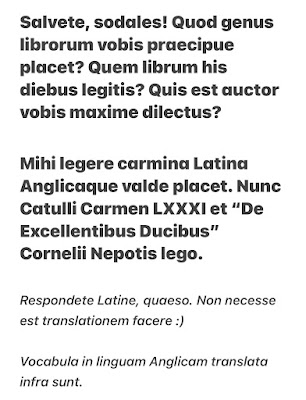Complete the literal translation of this text with the words / phrases listed below; a word or phrase may be used several times. The full text is given at the end but try the exercises first.
Nūntius ad obsessōs venit
hībernus, -a, -um: (adjective) winter; (here) used as a noun to refer to winter quarters i.e. a locations suitable for an army to spend the winter, especially military camps
hiemō,
-āre [1]: spend the winter
impavidus,
-a, -um: fearless
obsessus,
-a, -um: beseiged; here being used as a noun i.e. the beseiged (people)
oppidānus,
-ī [2/m], but mainly in the plural i.e. oppidānī: townspeople
reliquus,
-a, -um: remaining
[1]
Nūntius: Rōmānī, summō in perīculō __________!
Oppidānī: __________ summō
in perīculō __________?
Nūntius: Barbarī in
Ītaliā __________.
Oppidānī:
Barbarī __________ nōn __________. Rōmānī
__________. __________ Rōmānus? __________ __________ barbarī
terrent?
Messenger: Romans you are in the greatest danger.
Townspeople: Why ¦ are we in the greatest
danger?
Messenger: Barbarians are in Italy.
Townspeople: The barbarians don’t frighten us. We
are Romans. Are you a Roman? Why do the barbarians frighten you?
cūr; esne tū; estis; nōs; sumus; sunt; tē
[2]
Nūntius: __________ Rōmānus __________ sed barbarī __________ terrent. Nam multī __________. __________ quam __________ barbarī in Ītaliā __________. __________ ¦ __________, Rōmānī?
Messenger: I am a Roman but the barbarians frighten me, for there are many. There are ¦ more than 1000 barbarians in Italy. How many ¦ are you, Romans? [= How many of you are there?]
[3]
Oppidānī: Paucī __________. __________ modo __________ in oppidō __________.
Nūntius: __________ in
oppidō cōpiae __________
tam parvae __________? __________
reliquī armātī?
Oppidānī: __________
in Britanniā __________.
__________ in hībernīs __________.
__________ in Belgīs
hiemant. Sed __________ barbarī nōn
terrent.
Oppidānī: __________ impavidī
__________, Rōmānī!
Townspeople: We are few. [= There are few of us] There are only 100 armed men in the town.
Messenger: Why in the town are there so small forces
[= such small numbers] of armed men? Where are the remaining armed
men?
Townspeople: Some are in Britain. Some are in
winter quarters. Some are spending the winter in Belgium. But the
barbarians do not frighten us.
Messenger: How fearless you are, Romans!
armātī; armātōrum; centum; cūr; estis; nōnnūllī; nōs; quam; sumus; sunt; ubi sunt
____________________
Nūntius: Rōmānī, summō in perīculō estis!
Oppidānī: Cūr summō in perīculō sumus?
Nūntius: Barbarī in Ītaliā sunt.
Oppidānī: Barbarī nōs nōn
terrent. Rōmānī sumus. Esne tū Rōmānus? Cūr tē barbarī
terrent?
Nūntius: Ego Rōmānus
sum sed barbarī
mē terrent. Nam multī sunt. Plūs quam mīlle barbarī
in Ītaliā sunt. Quot vōs estis, Rōmānī?
Oppidānī: Paucī sumus. Centum modo armātī in oppidō sunt.
Nūntius: Cūr in oppidō cōpiae armātōrum tam parvae sunt? Ubi sunt reliquī armātī?
Oppidānī: Nōnnūllī
in
Britanniā sunt. Nōnnūllī in hībernīs sunt. Nōnnūllī in Belgīs hiemant. Sed nōs barbarī nōn terrent.
Nūntius: Quam impavidī estis, Rōmānī!











